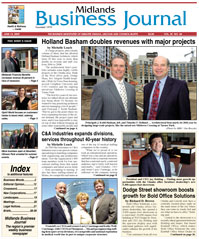Midlands Business Journal Asks About Data Backup and Recovery
- Comments: 3
- Written on: June 16th, 2009
 The Midlands Business Journal runs some really informative articles on subjects and trends that can seem daunting to many business owners. When they are doing a feature on a technology related subject they will often ask for some comments on the basic questions they plan on writing about in the feature.
The Midlands Business Journal runs some really informative articles on subjects and trends that can seem daunting to many business owners. When they are doing a feature on a technology related subject they will often ask for some comments on the basic questions they plan on writing about in the feature.
Michelle Leach is one of the MBJ’s most talented writers and she recently sent me an email with some questions about data recovery and data backup. Here were some of the questions she asked and how I answered them:
- What are the emerging trends with regard to business continuity/disaster recovery?
The corporate clients we service are becoming more an more aware of the need for off-site backups of their critical data.
Secure off-site backups like encrypted online services are entering the marketplace as an alternative to carting a removable drive home with you every night.
In the past, businesses have demonstrated the value they place in their methods of doing business and physical inventories by investing in trademarks and insurance policies.
As our economy shifts away from a manufacturing base and more toward an information base, organizations are understanding the need to protect their data assets just as they do their physical assets.
- Have you noted any changes with regard to the volume of clients/types of clients that are coming to you for help on this front?
We are seeing clients move away from the old CD and DVD backup methods. They are slow, typically incomplete, and are extremely prone to human error.
Software has evolved to a point where clients can automate their backups using flash drives, removable hard drives, and even online storage options.
We just spent 15 hours sorting out an office in Beatrice that did not have any standard operating procedures for their data. They had been backing up the same 2007 Peachtree information for three years while their current Peachtree files were being stored on the secretary’s workstation.
They had no backups, and all that stood between normal operations and a data recovery crisis was a single, 9 year-old hard drive. That is not an optimal situation.
- Do you think the economy has made business owners more proactive on this front or less (as they evaluate every dime) – why or why not?
The economy is actually forcing companies to look at their stored data in new ways. Small business owners are beginning to understand the power of couponing their products to their customers via email instead of direct mail.
They are starting to realize that you can look at a past customer’s purchasing history to predict future purchasing patterns.
All of these recession-busting sales and marketing strategies are based on current, accurate data. As companies invest in these next-generation strategies to keep their balance sheets in the black during a recession, they are also protecting these newly discovered tools just like a salesman of the 20th century would guard his call list.
They are making backups because they understand that the cost of losing that data would by far exceed the cost of protecting it.
- I know we talked about the data recovery clean room. Get me up to speed with that. When will that be offered and what does that mean for you as a company and for your clients?
Thanks for asking 🙂 We currently have a functioning class 10,000 clean room in our Lincoln Service Center. We have invested more that $70,000 in technology, equipment, training, and tools to establish the only fully-functional data recovery center in the Midwest (the next closest are in Texas and Minnesota).
Here are some Schrock Innovations Data Recovery Quick Facts:
- We have recovered over 100TB (roughly the equivalent of 900 standard PC hard drives) of data for our customers and clients in 2009 so far
- We are planning our next $50,000 investment to develop a class 100 clean room (allows us to do forensic data recovery)
- 80% of hard drives in our Data Recovery Center don’t need to be opened to recover the data
- We recover date most frequently from camera memory cards and flash drives than hard drives
- Hard Drives tend to fail in their 1st year of their 3rd year
- Larger drives are more likely to fail than smaller ones and are more difficult to recover when they do
- Only 12% of our data recovery jobs are “software jobs” (i.e. 90% require hardware equipment to facilitate recovery of data)
- If you liked this post, subscribe to my feed!
- Comments: 3
